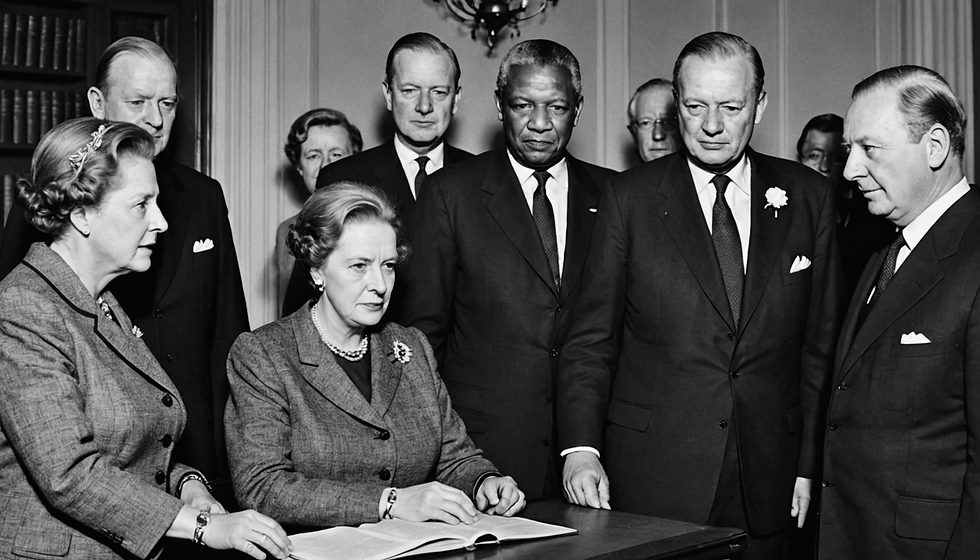Evaluating & expanding your options in a negotiation
- R.M. Boylan

- Feb 24
- 4 min read
Updated: Mar 9
R.M. Boylan BSc. M.A.

Evaluating & expanding options in a negotiation plan
Having options in a negotiation plan is crucial because they offer various routes to achieve an agreement. A range of options enables negotiators to remain flexible and adaptable, potentially leading to more innovative solutions that meet the interests of everyone involved. Options help prevent deadlocks and can promote a more cooperative environment during negotiations.
Differences & Similarities Between Options & Interests
While options and interests are related concepts in negotiation, they are distinct:
Interests: These are the underlying needs, desires, or concerns that motivate a party's position in a negotiation. Interests represent what each party truly wants to achieve.
Options: These are the specific proposals or solutions that can address the interests of one or both parties. Options are the means through which interests can be satisfied.
In summary, interests are the "why" behind a negotiation, while options are the "how" to achieve those interests. Options can be seen as potential solutions that aim to fulfill the interests of the parties involved.
Expanding Options at a Roadblock
When facing a roadblock in negotiations, it is crucial to expand options creatively. Here are some strategies to consider:
Brainstorming Sessions: Engage in collaborative brainstorming to generate a wide range of possibilities without immediate judgment.
Explore Interests: Revisit the underlying interests of both parties to identify new avenues for solutions.
Seek Third-Party Input: Involve a neutral third party to facilitate the discussion and provide fresh perspectives.
Reframe the Issue: Change the way the problem is presented to uncover new options that may not have been considered.
Harvard Negotiation Project Suggestions
The Harvard Negotiation Project emphasizes the importance of generating options to create value in negotiations. Some key suggestions include:
Separate people from the problem: Focus on the issue at hand rather than personal conflicts, which can help in generating more options.
Invent options for mutual gain: Look for win-win solutions that can satisfy the interests of both parties.
Use objective criteria: Establish standards or benchmarks to evaluate options, which can help in reaching a fair agreement.
Gaining Insights When Blocked or Stonewalled
When the other party has blocked or stonewalled discussions, consider the following approaches to gain deeper insights:
Ask Open-Ended Questions: Encourage dialogue by asking questions that prompt the other party to share their thoughts and feelings.
Active Listening: Demonstrate genuine interest in understanding their perspective, which may lead to more openness.
Identify Common Ground: Highlight shared interests or goals to create a more collaborative environment.
Be Patient and Persistent: Sometimes, taking a step back and allowing time for reflection can lead to breakthroughs in communication.
Utilizing these strategies allows negotiators to address obstacles and create a more effective negotiation environment.
References and Resources
Boylan, R.M. (2006-2009). Conflicts and considerations comparing Abraham Maslow's
hierarchy of needs to Jane Loevinger's model of ego development for assessing the level of development of a leader. M.A. Leadership Studies.
Blair, R. J. R. (2005). "Responding to the Emotions of Others: Dissociating Forms of Empathy through the Study of Antisocial Personality Disorder." Emotion, 5(1), 1-10.
Braden, G. (2000). The Isaiah Effect. Harmony Books.
Brunsson, N. (2007). The consequences of decision-making. Oxford University Press.
Cialdini, R.B. (1993). Influence: The Psychology of Persuasion. Harpers Collins
Publishers.
Cooper, D. F., & Chapman, C. B. (2005). Risk Management: A Project Management Approach. Taylor & Francis.
Covey, S. The 7 Habits of Highly Effective People. (1989). Stephen Covey.
"Dark Triad". Psychology Today United Kingdom. Retrieved July 6, 2022. First published by Delroy, L. Paulhus and Kevin M. Williams in 2002
Deutsch, M., Coleman, P.T. (2000). The Handbook of Conflict Resolution: Theory and Practice. Jossey-Bass Publishers.
Fisher, R., Ury, W., & Patton, B. (2011). Getting to Yes: Negotiating Agreement Without Giving In. Penguin Books.
French, J. R. P., & Raven, B. (1959). The bases of social power. In D. Cartwright
(Ed.), Studies in Social Power (pp. 150-167). Ann Arbor: University of Michigan Press.
Hare, R. D. (1991). The Hare Psychopathy Checklist-Revised (PCL-R). Toronto: Multi-Health Systems.
Harvard Business Review. (2019). On Negotiation. Harvard Business Review Press
Harvard Negotiation Project https://www.pon.harvard.edu/tag/the-harvard-negotiation-project/
Hofstede, Geert. (2017). Culture’s Consequences: Comparing values, behaviours, institutions and organizations across nations. A MASCAT Analysis.
Jung, C.G. (2002). Psychology of the Unconscious. Dodd, Mead & Company.
Kruglanski, A. W., & Webster, D. M. (1996). Motivated closing of the mind: "Seizing" and "freezing." Psychological Review, 103(2), 263-283.
Lewicki, R. J., Barry, B., & Saunders, D. M. (2015). Negotiation (7th ed.). McGraw-Hill Education.
O’Connor, J. & Prior, R. (1995). Successful selling with NLP: Neuro-linguistic programming the way forward in the new bazaar. Harper Collins Publisher.
Pritchard, C.L. (2001). Risk Management: Concepts and guidance Second edition. ESI International.
Rackham, N. (1988). SPIN Selling. Situation, Problem, Implication, Need-Payoff. McGraw-Hill Book Company.
Raiffa, H. (2002). Negotiation Analysis: The Science and Art of Collaborative Decision Making. Harvard University Press.
Raine, A. (2002). "Biosocial Studies of Antisocial and Violent Behavior." Journal of Abnormal Psychology, 111(1), 1-10.
Ries, A. Trout, J. (1981). Positioning : The Battle for your mind. Werner Books.
Salacuse, J.W. (2008). Seven secrets for negotiating with government: How to deal with local, state, national, or foreign governments and come out ahead. AMACOM
Thompson, L. (2014). The Mind and Heart of the Negotiator (6th ed.). Pearson.
Ury, W. (1993). Getting Past No: Negotiating Your Way from Confrontation to Cooperation. New York: Bantam Books.
Weiss, J. (2016). Harvard Business Review Guide to. Negotiating: Take the Lead Manage Conflict Get to Yes. Harvard Business Review Press





Comments